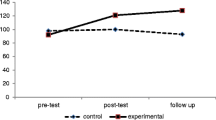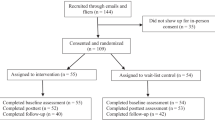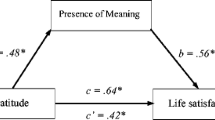Abstract
Although many studies have found the effect of group counseling on enhancement of meaning in life, few studies have employed the class group counseling in life education. The present study assessed the effect of class group counseling on life education for undergraduate students. Two classes from a Chinese university were randomly allocated into the intervention and control groups. The intervention group received class group counseling for 1.5 months. The intervention and control groups completed the meaning in life questionnaire (MLQ), the satisfaction with life scale (SWLS), and the positive affect and negative affect scales (PANAS) before and after the intervention. The results showed that the intervention improved students’ life satisfaction, positive affect, and presence of meaning, and decreased negative affect. These findings indicated that class group counseling could play an important role in the life education of undergraduate students. The current study extends our understanding of improving mental health and preventing suicide for undergraduate students.

Similar content being viewed by others
Data availability
Please download the supplementary material to get the raw data.
References
Akram, U., Ypsilanti, A., Gardani, M., Irvine, K., Allen, S., Akram, A., Drabble, J., Bickle, E., Kaye, L., Lipinski, D., Matuszyk, E., Sarlak, H., Steedman, E., & Lazuras, L. (2020). Prevalence and psychiatric correlates of suicidal ideation in UK university students. Journal of Affective Disorders, 272, 191–197. https://doi.org/10.1016/j.jad.2020.03.185
Ang, R. P., & O, J. (2012). Association between caregiving, meaning in life, and life satisfaction beyond 50 in an Asian sample: Age as a moderator. Social Indicators Research, 108(3), 525–534. https://doi.org/10.1007/s11205-011-9891-9
Bamonti, P., Lombardi, S., Duberstein, P. R., King, D. A., & Van Orden, K. A. (2016). Spirituality attenuates the association between depression symptom severity and meaning in life. Aging & Mental Health, 20(5), 494–499. https://doi.org/10.1080/13607863.2015.1021752
Barrios, L. C., Everett, S. A., Simon, T. R., & Brener, N. D. (2000). Suicide ideation among US college students associations with other injury risk behaviors. Journal of American College Health, 48(5), 229–233. https://doi.org/10.1080/07448480009599309
Baumeister, R. F., & Vohs, K. D. (2002). The pursuit of meaningfulness in life. In C. R. Snyder, & S. J. Lopez (Eds.), Handbook of positive psychology (pp. 608–618). Oxford University Press.
Breitbart, W., Rosenfeld, B., Pessin, H., Applebaum, A., Kulikowski, J., & Lichtenthal, W. G. (2015). Meaning-centered group psychotherapy: An effective intervention for improving psychological well-being in patients with advanced cancer. Journal of Clinical Oncology, 33(7), 749–754. https://doi.org/10.1200/JCO.2014.57.2198
Bryan, C. J., Elder, W. B., McNaughton-Cassill, M., Osman, A., Hernandez, A. M., & Allison, S. (2013). Meaning in life, emotional distress, suicidal ideation, and life functioning in an active duty military sample. The Journal of Positive Psychology, 8(5), 444–452. https://doi.org/10.1080/17439760.2013.823557
Chen, X., Yang, J., & Yang, X. (2022). Effect of using Satir model group intervention on improving meaning in life of college students. China Journal of Health Psychology, 30(02), 256–260. https://doi.org/10.13342/j.cnki.cjhp.2022.02.020
Cheng, M., Fan, F., & Peng, K. (2011). Psychological structure and measurement for sources of meaning in life. Chinese Journal of Clinical Psychology, 19(05), 591–594. https://doi.org/10.16128/j.cnki.1005-3611.2011.05.007
Cheng, M., Hasche, L., Huang, H., & Su, X. S. (2015). The effectiveness of a meaning-centered psychoeducational group intervention for Chinese college students. Social Behavior and Personality, 43(5), 741–756. https://doi.org/10.2224/sbp.2015.43.5.741
Cho, E. H., Lee, D. G., Lee, J. H., Bae, B. H., & Jeong, S. M. (2014). Meaning in life and school adjustment: Testing the mediating effects of problem-focused coping and self-acceptance. Procedia-Social and Behavioral Sciences, 114, 777–781. https://doi.org/10.1016/j.sbspro.2013.12.784
Costanza, A., Prelati, M., & Pompili, M. (2019). The meaning in life in suicidal patients: The presence and the search for constructs. A systematic review. Medicina, 55(8), 465. https://doi.org/10.3390/medicina55080465
Dezutter, J., Casalin, S., Wachholtz, A., Luyckx, K., Hekking, J., & Vandewiele, W. (2013). Meaning in life: An important factor for the psychological well-being of chronically ill patients? Rehabilitation Psychology, 58(4), 334–341. https://doi.org/10.1037/a0034393
Durlak, J. A. (1994). Changing death attitudes through death education. In R. A. Neimeyer (Ed.), Death anxiety handbook: Research, Instrumentation, and Application (pp. 243–260). Routledge.
Fan, F. (2005). The development of group counseling in China: Review and prospect. Journal of Tsinghua University (Philosophy and Social Sciences), 20(6), 62–69.
Frankl, V. E. (1963). Man’s search for meaning: An introduction to logotherapy. New York: Washington Square Press.
Gallagher, M. L., & Miller, A. B. (2018). Suicidal thoughts and behavior in children and adolescents: An ecological model of resilience. Adolescent Research Review, 3(2), 123–154. https://doi.org/10.1007/s40894-017-0066-z
Ghamari, M. (2013). Effectiveness of group counseling with logotherapy approach on college student’s quality of life. Contemporary Educational Researches Journal, 3(1), 6–11.
Halama, P., & Dědová, M. (2007). Meaning in life and hope as predictors of positive mental health: Do they explain residual variance not predicted by personality traits? Studia Psychologica, 49(3), 191–200.
Heisel, M. J., & Flett, G. L. (2004). Purpose in life, satisfaction with life, and suicide ideation in a clinical sample. Journal of Psychopathology and Behavioral Assessment, 26(2), 127–135.
Heisel, M. J., & Flett, G. L. (2016). Does recognition of meaning in life confer resiliency to suicide ideation among community-residing older adults? A longitudinal investigation. The American Journal of Geriatric Psychiatry, 24(6), 455–466. https://doi.org/10.1016/j.jagp.2015.08.007
Ho, M. Y., Cheung, F. M., & Cheung, S. F. (2010). The role of meaning in life and optimism in promoting well-being. Personality and Individual Differences, 48(5), 658–663. https://doi.org/10.1016/j.paid.2010.01.008
King, L. A., Hicks, J. A., Krull, J. L., & Del Gaiso, A. K. (2006). Positive affect and the experience of meaning in life. Journal of Personality and Social Psychology, 90(1), 179–196. https://doi.org/10.1037/0022-3514.90.1.179
Kleiman, E. M., Adams, L. M., Kashdan, T. B., & Riskind, J. H. (2013). Gratitude and grit indirectly reduce risk of suicidal ideations by enhancing meaning in life: Evidence for a mediated moderation model. Journal of Research in Personality, 47(5), 539–546. https://doi.org/10.1016/j.jrp.2013.04.007
Kleiman, E. M., & Beaver, J. K. (2013). A meaningful life is worth living: Meaning in life as a suicide resiliency factor. Psychiatry Research, 210(3), 934–939. https://doi.org/10.1016/j.psychres.2013.08.002
Larsen, R. J., Diener, E. D., & Emmons, R. A. (1985). An evaluation of subjective well-being measures. Social Indicators Research, 17(1), 1–17. https://doi.org/10.1007/BF00354108
Lei, J., & Xie, G. (2005). Summary of the research on life education in China in recent ten years. Education Exploration, 05, 92–94.
Li, X., & Huang, H. (2014). The practice of life education and its enlightenment in Britain, America and Japan. Education Exploration, 07, 146–148.
Liu, H., Yang, Y., Wang, W., Zhao, R., Chen, X., & Yang, J. (2020). Effect of life meaning group counseling on college fresh students’ mental symptom. Chinese Mental Health Journal, 34(05), 393–397. https://doi.org/10.3969/j.issn.1000-6729.2020.5.002
Mortier, P., Cuijpers, P., Kiekens, G., Auerbach, R. P., Demyttenaere, K., Green, J. G., Kessler, R. C., Nock, M. K., & Bruffaerts, R. (2018). The prevalence of suicidal thoughts and behaviours among college students: A meta-analysis. Psychological Medicine, 48(4), 554–565. https://doi.org/10.1017/S0033291717002215
Nell, W. (2014). Exploring the relationship between religious fundamentalism, life satisfaction, and meaning in life. Journal of Psychology in Africa, 24(2), 159–166. https://doi.org/10.1080/14330237.2014.903074
Ostafin, B. D., & Feyel, N. (2019). The effects of a brief meaning in life intervention on the incentive salience of alcohol. Addictive Behaviors, 90, 107–111. https://doi.org/10.1016/j.addbeh.2018.10.035
Park, N., Park, M., & Peterson, C. (2010). When is the search for meaning related to life satisfaction? Applied Psychology: Health and Well-Being, 2(1), 1–13. https://doi.org/10.1111/j.1758-0854.2009.01024.x
Reker, G. T., & Wong, P. T. (2012). Personal meaning in life and psychosocial adaptation in the later years. The human quest for meaning: Theories, research, and applications (pp. 479–502). Routledge.
Schnell, T. (2011). Individual differences in meaning-making: Considering the variety of sources of meaning, their density and diversity. Personality and Individual Differences, 51(5), 667–673. https://doi.org/10.1016/j.paid.2011.06.006
Shi, X., Zhu, Y., Wang, S., Wang, A., Chen, X., Li, Y., & Jiang, L. (2021). The prospective associations between different types of sleep disturbance and suicidal behavior in a large sample of Chinese college students. Journal of Affective Disorders, 279, 380–387. https://doi.org/10.1016/j.jad.2020.10.019
Steger, M. F. (2009). Meaning in life. In S. J. Lopez, & C. R. Snyder (Eds.), Oxford handbook of positive psychology (pp. 679–687). Oxford University Press.
Steger, M. F., Frazier, P., Oishi, S., & Kaler, M. (2006). The meaning in life questionnaire: Assessing the presence of and search for meaning in life. Journal of Counseling Psychology, 53(1), 80–93. https://doi.org/10.1037/0022-0167.53.1.80
Tang, H., & Dai, M. (2017). The intervention study on depressive emotion of college students via life education group counseling. Journal of Wenzhou University (Social Science Edition), 30(3), 110–116. https://doi.org/10.3875/j.issn.1674-3555.2017.03.016
Van Tongeren, D. R., Green, J. D., Hook, J. N., Davis, D. E., Davis, J. L., & Ramos, M. (2015). Forgiveness increases meaning in life. Social Psychological and Personality Science, 6(1), 47–55. https://doi.org/10.1177/1948550614541298
Walters, J. D. (1986). Education for life. California: Ananda Publications.
Wang, L. (2020). Meaning-centered group psychotherapy intervention in the sense of meaning of life in patients with advanced cancer (Master’s dissertation, Northwest Normal University)
Wang, M., Kou, C., Bai, W., Song, Y., Liu, X., Yu, W., Li, Y., Hua, W., & Li, W. (2019). Prevalence and correlates of suicidal ideation among college students: A mental health survey in Jilin Province, China. Journal of Affective Disorders, 246, 166–173. https://doi.org/10.1016/j.jad.2018.12.055
Wang, E., & Peng, X. (2017). Intervention effect of group counseling on meaning of life: A therapy based on Sandplay and Satir Model. Chinese Journal of Clinical Psychology, 25(02), 315–318. https://doi.org/10.16128/j.cnki.1005-3611.2017.02.026
Watson, D., Clark, L. A., & Tellegen, A. (1988). Development and validation of brief measures of positive and negative affect: The PANAS scales. Journal of Personality and Social Psychology, 54(6), 1063–1070. https://doi.org/10.1037/0022-3514.54.6.1063
Wong, P. T. P. (2013). Toward a dual-systems model of what makes life worth living. The Human Quest for Meaning: Theories, research, and applications (pp. 49–68). Routledge.
Wong, P. T. P. (2017). Meaning-centered approach to research and therapy, second wave positive psychology, and the future of humanistic psychology. The Humanistic Psychologist, 45(3), 207–216. https://doi.org/10.1037/hum0000062
Yalçın, İ., & Malkoç, A. (2015). The relationship between meaning in life and subjective well-being: Forgiveness and hope as mediators. Journal of Happiness Studies, 16(4), 915–929. https://doi.org/10.1007/s10902-014-9540-5
Yu, E. A., Chang, E. C., & Kim, J. H. J. (2016). Asian American culturally relevant values as predictors of meaning in life in Asian and European American college students: Evidence for cultural differences? Asian American Journal of Psychology, 7(3), 159–166. https://doi.org/10.1037/aap0000042
Zhang, Y., Wu, C., Yuan, S., Xiang, J., Hao, W., & Yu, Y. (2018). Association of aggression and suicide behaviors: A school-based sample of rural Chinese adolescents. Journal of Affective Disorders, 239, 295–302. https://doi.org/10.1016/j.jad.2018.07.029
Zhang, Y., Yuan, B., Wang, K., & Shen, T. (2021). The effect of impulsivity traits on senior high school students’ suicidal ideation: The role of campus exclusion and sense of life meaning. Studies of Psychology and Behavior, 19(01), 89–95.
Zhao, F. (2012). Experimental research on group counseling activities of adolescent life education (Master’s dissertation, Qufu Normal University).
Zhuang, Y., & Shen, Y. (2015). The effectiveness of logotherapy group counseling in alleviating the relapse tendency of drug abstainers. Journal of Psychological Science, 38(02), 468–473. https://doi.org/10.16719/j.cnki.1671-6981.2015.02.020
Acknowledgements
This study was supported by the Social Science Foundation of Shaanxi Province (2021P011, 2021P019), the Research Project on Emergency Services for Epidemic Prevention and Control of Yan’an University (ydfk043, ydfk040), and the Innovation Capability Support Program of Shaanxi Province, China (2020TD-037). We thank Yongchuan Fu for his helpful suggestions during study design. We thank Juanjuan Sun for polishing the language of our manuscript.
Author information
Authors and Affiliations
Contributions
Conceptualization: Caixia Yang, Ruiru Liu, Wei Wang; Methodology: Zhongling Pi, Xiying Li; Formal analysis and investigation: Caixia Yang, Zhongling Pi, Xiying Li; Writing - original draft preparation: Caixia Yang, Ruiru Liu, Wei Wang; Writing - review and editing: Caixia Yang, Zhongling Pi, Wei Wang; Funding acquisition: Caixia Yang, Wei Wang.
Corresponding author
Ethics declarations
Conflicts of interest
On behalf of all authors, the corresponding author states that there is no conflict of interest.
Ethics approval statement
Ethics approval was obtained from the local Ethics Committee of Shaanxi Normal University.
Consent to participate
Informed consent was obtained from all individual participants included in the study.
Additional information
Publisher’s note
Springer Nature remains neutral with regard to jurisdictional claims in published maps and institutional affiliations.
Electronic supplementary material
Below is the link to the electronic supplementary material.
Rights and permissions
Springer Nature or its licensor holds exclusive rights to this article under a publishing agreement with the author(s) or other rightsholder(s); author self-archiving of the accepted manuscript version of this article is solely governed by the terms of such publishing agreement and applicable law.
About this article
Cite this article
Yang, C., Pi, Z., Liu, R. et al. The class group counseling on life education improves meaning in life for undergraduate students. Curr Psychol 42, 25345–25352 (2023). https://doi.org/10.1007/s12144-022-03623-9
Received:
Revised:
Accepted:
Published:
Issue Date:
DOI: https://doi.org/10.1007/s12144-022-03623-9




